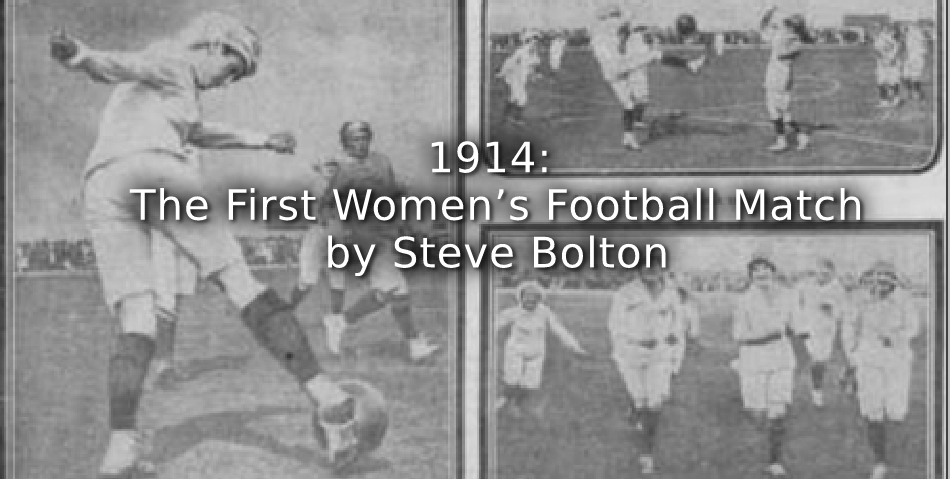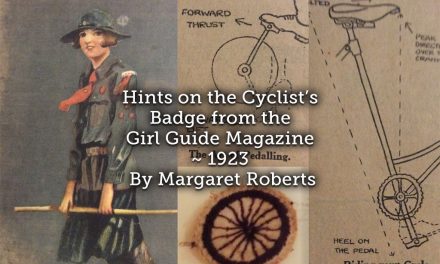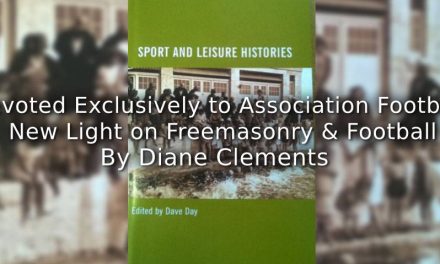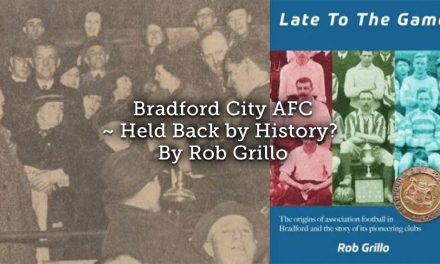Crowd of 5,000 in Portsmouth
Superstar Ada Anscombe Scores 4
Portsmouth Ladies FC – WW1 Pioneers

Portsmouth Ladies Pictured in 1917 – 3 Years Later in Daily Mirror
“The girls saluted the wounded when they arrived on the field”
Source: BNA Daily Mirror Saturday 18 September 1917 p12
1917 Portsmouth Ladies FC 5 v 3 Woolwich Arsenal Men (Army Ordnance Dept)
The striking photograph above was taken during the game on Thursday 6 September 1917 at ‘The Den’, home of professional male side Millwall FC. This was not the first game to be played on a ‘male’ ground but the fact that it was a high profile London ground was taken as evidence that the English Football Association had completely (if temporarily) relaxed their 1902 ban due to war conditions. This was one of a number of games Portsmouth played against male teams which was championed by the national Daily Mirror and helped to popularise the idea of women playing football as a patriotic idea to be supported. Whilst their games against women’s opposition were competitive affairs the games against men would be contrived for the men to sportingly lose to conform to social expectations of the time.
Dick Kerr Ladies – Latecomers to Women’s Football

Dick Kerr Ladies at Herne Hill Velodrome in 1925
Source: Lizzy Ashcroft Collection
1,000 Games in World War One Seasons
When the Dick Kerr Ladies held their first game on Tuesday 25th December 1917, the footballers of the Northeast of England were about to hold their 115th game. Remarkably, the game was an international against a Northern Irish selection in Belfast. Women’s football had established so much during WW1 that if we include the 1918-1919 ‘war season’ then over 1,000 high profile games were played. A vast fortune was raised to support the war effort. The highly influential national newspaper the Daily Mirror championed all aspects of the national interest through its patriotic articles and highly evocative photograph pages. Although the bulk of women’s football took place during the two 1917-1918 and 1918-1919 ‘war seasons’ the newspaper championed one particular pioneering team from as early as September 1916 – the Portsmouth Ladies FC. After four early games starting in August 1916 the team was formally constituted in December 1916. Unusually, the bulk of the Portsmouth teams early matches were played against men’s teams.
What is Football?

1895 British Ladies ‘Football’ Match – Crouch End
Source: BNA The Graphic Saturday 30 March 1895
‘Modern’ Women’s Football Started in World War 1
‘Modern’ women’s football started in WWI. This is my viewpoint. There were many recorded ‘football’ games involving women prior to WWI but I tend not to write or research about them. The newspaper articles of the time record that the women’s football matches in 1881 and mid-1890s involving women would not resemble anything like the modern football we are familiar with. This is not to say that they were not important. In fact, I would argue that they were of great social significance, are poorly understood in the context of the era and deserve more research. I simply do not include them in my analysis of women’s football history. This article is about what I regard to be the first ‘modern’ style football game. My definition would include that the game was played in the correct football type kit. I would also include the facts that the players had received some coaching and were trying to play positional football.
19 March 1914 – ‘Portsmouth Ladies’ 5 v 1 ‘What A Game Lady Artistes’

National Newspaper Daily Mirror Championing the First Match
“Girls Play Football for Charity at Portsmouth”
1] “The crowd watching the game”
2] “An exciting moment in the goalmouth”
3] “The local goalkeeper”
Source: BNA Daily Mirror Friday 20 March 1914 p12
Crowd 5,000 – United Services Football Ground, Pitt Street, Portsmouth
The written and visual evidence for this ‘first modern game’ is striking. It is worth emphasising that this game was played on Thursday 19 March, 1914. The Portsmouth Evening News presaged the game with the following report:
Ladies Football Match:
Tickets are going well for the football match at Pitt-Street at 2.30pm tomorrow, in aid of the Submarine A7 Disaster Fund, between eleven ladies now performing at the King’s Theatre, and eleven local ladies who have been formed into a team by Mr Len Lelliot, of the Royal Yacht Alexandra. They will play in strict football costumes. Bombardier Wells is to referee the match.
1914 Game Featured in Newspaper Pictures

Featured in Leeds Mercury
“Ladies Charity Football Match”
“An exciting moment when one of the feminine forwards scored with a splendid shot”
Source: BNA Leeds Mercury Saturday 21 March 1914 p3

Featured in Glasgow Daily Record
“Ladies Play a Football Match for Charity’s Sake”
“An incident in the game”
Source: BNA Daily Record Saturday 21 March 1914 p6
1914 – Ada Anscombe – A Portsmouth Superstar is Born
It is important to note that although the Portsmouth Ladies were not to be formally constituted until two years later in 1916 we see an early example of their star centre forward and Honorary Secretary Ada Anscombe in action, scoring 4 goals in the ‘first game’. The game was also featured in the Leeds Mercury and even more remarkably in the Glasgow newspaper, The Daily Record. One of the points that I am trying to make in my claim for this to be the first game is the serious nature of the football played. The following is the report about the game from the Portsmouth Evening News:
“played the regulation game with remarkable skill”
Football For Charity – Ladies Match at Portsmouth
Football for charity was played under novel circumstances at the Pitt-Street ground yesterday afternoon. Following a match between a team representative of the Royal Yacht Alexandra and an eleven drawn from artistes appearing in “What a Game” Company, in which the former were successful by eight goals to five, eleven local ladies met a side composed of lady artistes from the King’s Theatre.
The ladies, who were attired in correct football gear, were given a great ovation by over 5,000 spectators on taking the field. After facing the photographers they lined up to the whistle of Mr Lawson, who acted as referee, and for an hour played the regulation game with remarkable skill on a very slippery and heavy turf. A feature of the match was the play of Miss Anscombe, the centre forward of the Portsmouth ladies, who scored four goals for her side, and was chiefly responsible for their five to one victory. The other goal was obtained by Miss Yates, and Miss Carlyle responded for the artistes. When they retired the ladies were loudly cheered.
The teams were as follows:
Local Ladies – The Misses Davey; Cage and Warwick; Woods, Gauntlet, and James; Yates, Arnold, Anscombe, E. G. Warwick, and Grey.
Lady Artistes – The Misses Day; Hackett, Band; Sutherland, Simpson, Ray; Taylor, Silverno, Carlyle, Murrie, and Blakeney.
After the match the players were entertained to tea at Madden’s Hotel, and the work of Messrs, Lellicott and Naysmith, who organised the venture, was warmly eulogised. The local ladies were afterwards invited to witness a performance at the King’s Theatre. A substantial amount will be handed over to the Naval Disasters Fund as the result of the matches.
The King’s Theatre – What a Game!

Advert for King’s Theatre, Portsmouth
Source: BNA Portsmouth Evening News Tuesday 17 March 1914 p1
Music Hall
Touring troupes of music hall entertainers would often try to arrange a football match when their show was in town. Prior to WWI there were a number of examples of women’s football matches from the entertainment industry. Despite the title, this revue was not a football themed revue. A review in the Tottenham and Edmonton Weekly Herald describes the first scene at a ‘Weekenders’ Hotel’ with characters including: a rapacious hotel keeper, a terrible Spaniard, Lord Monty and a Spanish Lady searching for her husband with a knife!
1914 Game Was Banned

“Instead of Fratton Park”
Source: BNA Portsmouth Evening News Tuesday 17 March 1914 p4
1902 Ban Interpreted by Portsmouth FC Directors
Fratton Park has been the home of Portsmouth Football Club since 1899 and was thus under the jurisdiction of the English FA. Shortly after the game the Portsmouth Football Club had to write to the Portsmouth FA to explain their decision. On Friday 3 April, 1914 the Portsmouth Evening News reported:
At a meeting of the Portsmouth F.A. Council, presided over by Mr. H. R. Sharp, last night, a letter was read from the Portsmouth Football Club explaining why they refused to grant the use of Fratton Park for the match between two ladies’ teams in aid of the Naval Disasters Fund. The letter pointed out that there would have been no objection to lending the ground but for the fact that the applicant, under a decision of the P. F. A. (Portsmouth Football Association), was not eligible to take part in the football, and surprise was expressed that the match was afterwards played at Pitt Street.
It was pointed out in the course of discussion that the Pitt Street ground was not under the jurisdiction of the P. F. A., and it was generally agreed that the Portsmouth Club took the only course open to them under the circumstances. To prevent a repetition of a similar occurrence it was decided to refer the matter so far as the application and the granting of the Pitt Street ground to the Hants Association.
Portsmouth FC are making it quite clear that they have not allowed the fundraising games to take place because they included a ladies match. It is worth noting that this was 7 years before the infamous 1921 ban. This was not the end of the matter because the very next day a very indignant response was received from the Royal Yacht Alexandra and was reproduced in the Portsmouth Evening News:
Mr. R. Naismith, of the Royal yacht Alexandra, writes: – “In your report under World of Sport, re the ladies football match at Pitt Street, you state at a meeting of the Portsmouth Football Association that a letter was received from the Portsmouth Football Club stating that the reason of objection to lending ground was that the applicant was not eligible to take part in football. As the application came from the officers and men of the Royal yacht Alexandra, and as no one there is under suspension from playing football, it came as a great surprise to read the same. There was no alternative but to play the match at Pitt Street. I think that the directors have been misinformed.”
It is worth noting that it is the staff of the ‘Royal’ yacht, fundraising for naval disasters in the home of the navy who are being denied the use of a football ground, merely because of the gender of two of the teams. Rather than cancel the women’s game they moved the fixture. I think that they can be commended for this.
1902 English FA Ban

English FA Minute Book – 1902
Source: Courtesy English National Football Museum
Monday 25 August 1902 FA Annual Meeting
This was the last meeting of the FA at 61, Chancery Lane. Item 23 on their agenda was:
23- It was decided to instruct affiliated Associations to refuse permission for its players to play against lady football teams.
The influential Sporting Life newspaper had this to say about the ban:
“Then, as a tit-bit to close these remarks, comes the proposal of Mr Albert, of the Kent F.A. that affiliated associations shall not allow their players to play against the so-called team of “Lady Footballers,” which is about to tour the Southern Counties. Rival teams of girls may kick a football about if they please, but it is bringing the game into ridicule for men to seriously arrange matches with women. Mr. Albert’s resolution must, of course, be understood to imply that he is aware that these “matches” between the sexes are being arranged. The good sense of clubs should prevent them from doing this, and it is a matter for regret that it should be necessary to deal with the matter officially.”
A later report in the Tottenham and Edmonton Weekly Herald had this to say in a short article entitled: “Lady Footballers at Broomfield”.
“Their costumes, some in black dresses and white aprons and caps, others in grey, blended nicely, and when the game was in full swing the effect was very pretty.
“Such Females Degrade Their Sex”
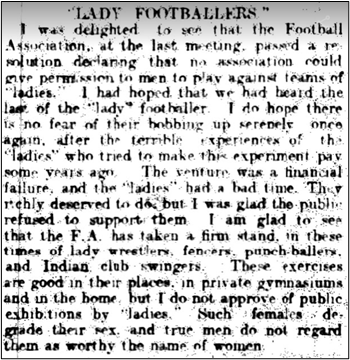
Commentary on the English FA Ban of 1902
Source: BNA Burnley Gazette Saturday 6 September 1902 p2
1902 Ban Still in Place in 1921…
“Lady Footballers”
I was delighted to see that the Football Association, at the last meeting, passed a resolution declaring that no association could give permission to men to play against teams of “ladies”. I had hoped that we had heard the last of the “lady” footballer. I do hope there is no fear of their bobbing up serenely once again, after the terrible experiences of the “ladies’ who tried to make this experiment pay some years ago. The venture was a financial failure, and the “ladies” had a bad time. They richly deserved to do, but I was glad the public refused to support them. I am glad to see that the F.A. had taken a firm stand, in these times of lady wrestlers, fencers, punch-ballers and Indian Club Swingers. These exercises are good in their places, in private gymnasiums and the home, but I do not approve of public exhibitions by “ladies.” Such females degrade their sex, and true men do not regard them as worthy of the name of women.
Whilst the author of the above article uses strong language, the tone does generally reflect contemporary views published in the press. It is worth noting that this ban was still in place during WWI when women’s football began to increase. The matter was put to the three man emergency committee of the FA during the war and they referred the issue to a time when the full committee was reconstituted i.e. they ‘parked’ the issue.
Although the wording of the ban specifically references mixed games, the prevailing view towards women on the football pitch was of such a farcical nature that the ban really encompassed all women’s football games.
Conclusion
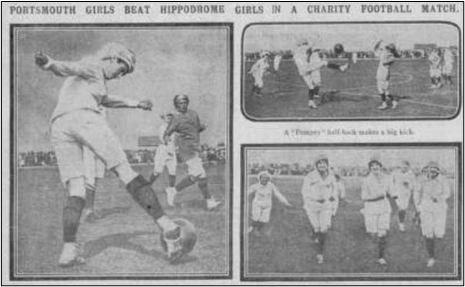
September 1916 Game Featured in Daily Mirror
Portsmouth Ladies 4 v 0 Hippodrome Ladies
“Correctly Clad in Shorts and Boots”
(Source: BNA Daily Mirror Friday 8 September 1916 p12)
WWI – The Portsmouth Trailblazers and The Dagenham Invincibles
The game above took place on Wednesday 6 September at the North End Recreation Ground in Portsmouth. The Crowd was later reported as 30,000. This is almost as silly as the 53,000 reported for the St Helens game against the Dick Kerr Ladies on 27 December 1920. The game was one feature of a huge Portsmouth Gala day to raise funds for ‘Wounded Heroes.’ Photographer (and women’s football champion) Stephen Cribb reported that:
“Several of the players warded the ball off with their hands instead of their heads, but many of them kicked and dribbled in true professional style.”
The Portsmouth Ladies continued playing and fundraising until 1919. I highly recommend the article: “Gender, Photography and Women’s Football in England: The Portsmouth Ladies FC, 1916-1918 by Dr Alexander Jackson. I would also recommend the work of the Portsmouth History Society.
The astonishing rise of women’s football during the 1917-1918 war season owes an awful lot to the pioneering Portsmouth Ladies. During the latter part of WWI the Dagenham Invincibles became the ‘poster girls’ of women’s football, completing two whole undefeated seasons. They were featured regularly in the Daily Mirror and Pathe News clips in their iconic quartered blue kit. They were following the legacy of the trailblazing Portsmouth Ladies. If we include the 1918-1919 ‘war season’ then I estimate there were around 1,000 high profile women’s football matches, raising a fortune for much needed charity. The 29 games played by the Dick Kerr Ladies were a part of this, as were the over 270 recorded games in the northeast of England.
There is a strong argument that the Portsmouth Ladies FC were the pioneering trailblazers of ‘modern’ women’s football. In my view, Portsmouth also hosted the real ‘modern’ game of women’s football – and it was in 1914 and it was banned!
Article © of Steve Bolton

